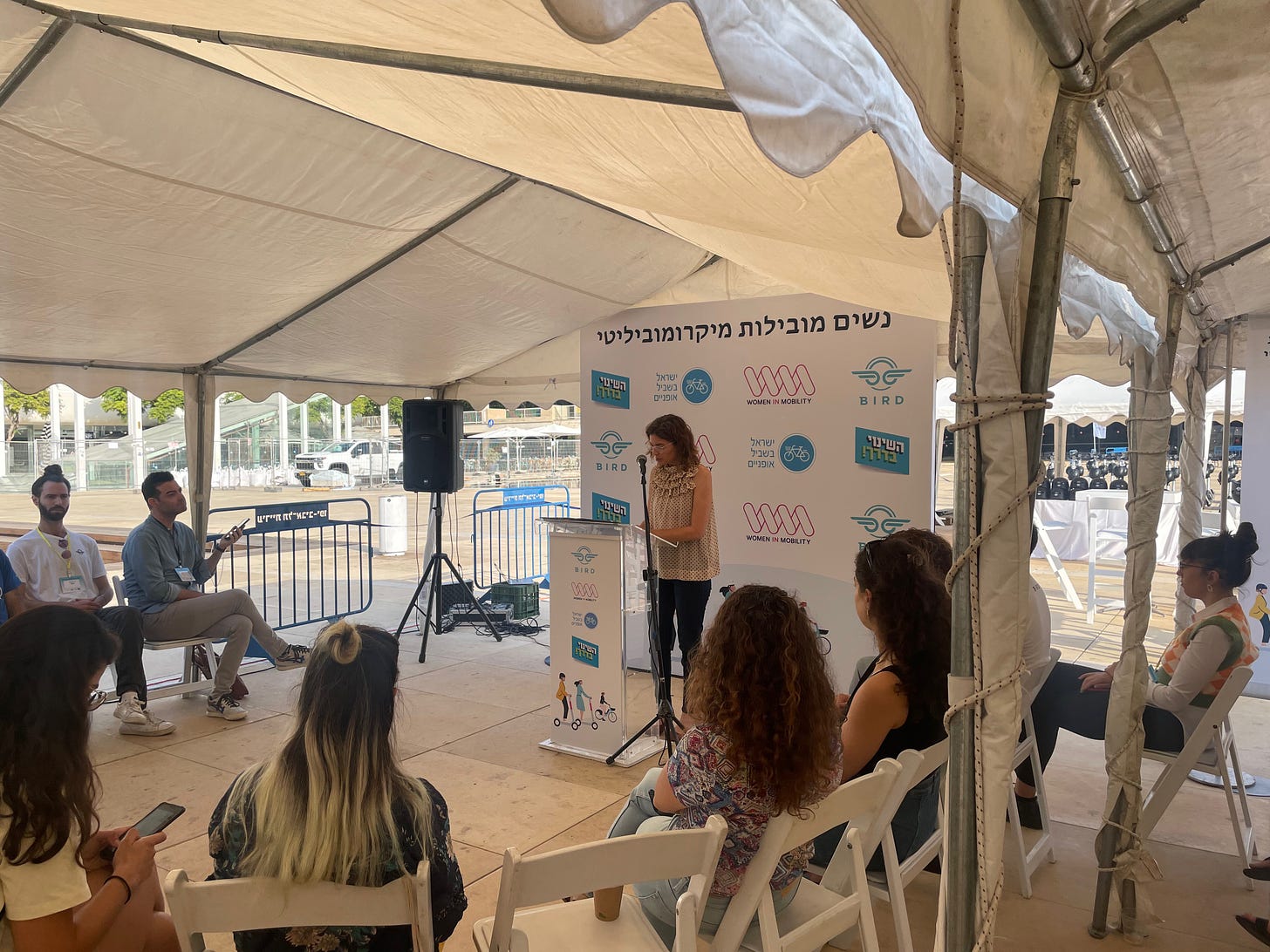Israel Week Ending October 29
Gantz Outlaws Palestinian Orgs, Blue Flag Exercise, Covid, Israeli Unicorns and more
THE KNESSET
Last Friday, Defense Minister Gantz declared that six Palestinian civil rights organizations were actually fronts for the infamous terror group, Popular Front for the Liberation of Palestine. Gantz’s actions appeared to catch everyone unprepared. Prime Minister Bennet was, in fact abroad, in Russia, at that time. As I said, when asked on i24News about the decision, since I do not have access to any of the intelligence on which Gantz based his decision, I can’t offer an opinion regarding whether or not his action was justified. However, I can say that the declaration was handled terribly. Gantz acted as if his statement was just the outcome of a routine administrative decision, without understanding, (or perhaps merely ignoring) the potential international implications. A decision like this should have been discussed in the security cabinet, and if approved, all relevant government agencies should have been armed with the facts. On the facts, as I said, I have no idea; on the execution, I give Gantz a grade of “D”. The declaration also resulted in some political fireworks, with Labor Leader and Transportation Minister Merav Michaeli publicly criticizing Gantz, and Gantz party members returning fire.
This week, the government reached the long-anticipated decision to approve the building of 3,000 housing units in West Bank settlements. Despite the complex ideological makeup of this broad coalition, this decision was expected, and long telegraphed. Approval for 2,000 units of housing for Palestinians in Area C was also proposed, in efforts to soften the diplomatic damage of the new West Bank construction. However, somehow, the housing for Area C appears to have been delayed.
The national budget was approved in the Knesset Committee this week, and all indications are that it will pass the full Knesset before the November 15th deadline.
DIPLOMACY
The President of the Democratic Republic of Congo visited Israel this past week.
However, the real statecraft this week was diplomacy of a different type; and that was the Blue Flag Exercises that took place at the Uvda Air Base in the Negev. These extraordinary training exercises were attended by Air Force commanders from the United States, Italy, the UK, Greece, Cyprus, Norway, the United Arab Emirates, India, and the Netherlands, along with ambassadors from France, the UK, Greece, and Germany. It was reported this morning that Jordan secretly participated in the exercise, as well. More than anything, these cooperative exercises show that Israel is not alone in the world. According to the Israeli Air Force, its pilots and controllers are learning a great deal about operating as part of a coalition, thanks to this momentous/historic training operation.
Next week, Bennett is scheduled to fly to Glasgow to participate in the Climate Conference. The Israeli government has decided to commit to zero emissions by 2050. It now needs a plan to get there. Bennett has a full plate of bilateral meeting planned, which include: UK PM Boris Johnson, French President Emmanuel Macron, Aussie PM Scott Morrison, Italian PM Mario Draghi, PM of Bahrain Salman bin Hamad Al Khalifa, Honduras Pres. Juan Orlando Hernández, and NATO Sec.-Gen. Jens Stolenberg.
COVID–19
The daily Covid infection numbers keep dropping. By all accounts, unless something terrible and unexpected happens, the wave of the Delta variant seems to be behind us. Yesterday, there were 642 new cases, with a positive rate of tests below 1%. The number of seriously ill has fallen to 238. I, who have been personally very careful to date, have begun to ease up a little. Yesterday , I attended my first large public event. It was outdoors, but conducted in a confined space, with food being served. Later in the day, I went out to lunch with my son at an indoor restaurant for the first time since the start of the Delta wave. I am finally feeling genuinely optimistic.
MEDIA
A long article by NY Times Bureau Chief Patrick Kingsley, titled, “Whose Promised Land? A Journey in a Divided Israel,” that appeared this week in Times, disturbed me greatly. As a part-time journalist, I felt embarrassed, as the article confirmed some explicit biases. Nothing in the piece was false, but the story itself presented a misleading narrative. The selection of interviewees was absurd. Kingsley began the article speaking with an elderly Kibbutznik in the North, who was somewhat bitter about the direction of the country. He then interviewed a haredi man in Tiberias, followed by an Israel Arab poet in Haifa, who described Haifa as part of “occupied Palestine.” Kingsley neglected to interview a single Arab Israeli doctor, engineer, or teacher.
When he got to Tel Aviv, did Kingsley interview a high-tech entrepreneur? Or an engineer working for Google? No, he interviewed one of the original residents of an area called “Givat Amal,” one of the holdouts, whose refusal to move thwarts gentrification efforts of that development. And what did the Times choose to highlight in bold? “To its residents, the unpaved alleys of Givat Amal Bet — a small, rundown Tel Aviv neighborhood — are evidence of Israel’s persistent discrimination against Jews of Middle Eastern origin.”
Only at the end of the section on “Givat Amal,” after detailing all the incidents of discrimination the woman being interviewed claims to have endured, does Kingsley write, “The irony is that the businessmen building the towers and seeking their eviction are mostly Mizrahi, too. And they’re some of the wealthiest people in Israel. The grandchildren of the area’s original residents are also doing well. They include lawyers and architects, doctors and military officers.”
It is sad that the New York Times Bureau Chief in Israel, who is located in Jerusalem (part of the problem, in IMHO), does not understand the true fundamental divide in Israel today — i.e. between those who want to be part of the 21st century, integrated into the world, and those who wish to continue to live in their ghettos. However, that is indeed a much longer story.
There’s a worthwhile article in this week’s edition of The Atlantic, titled: “Palestine Isn’t Fergurson.” It’s quite long, but worth the read.
TEL AVIV
This is a new section in the newsletter, which I will attempt to include every week. It will contain a little slice of what's going on in Tel Aviv, which I consider the heart of Israel (and the place I’m privileged to call home). So, in a “meta” move … don’t be surprised if, in the coming weeks, this newsletter's name changes to “Tel Aviv Diary”.
This week I attended a rather unusual event, held in Habima Square. The purpose of the gathering was to encourage women to enter the world of micro-mobility (by riding scooters and bicycles) in the city. It turns out that only 27% of women, as compared to 58% of men, ever ride a micro-mobility vehicle in Tel Aviv — a similar percentage has been found in countries all over the world, with the exception of the Netherlands.
So, together with several organizations, the scooter company, “Bird” sponsored a morning event to encourage women to use micro-mobility. They were able to attract two Knesset Ministers who have a direct interest in the area — Minister of Transportation Merav Michaeli and Minister of the Environment Tamar Zandberg, along with Deputy Mayor of Tel Aviv Meital Lehavi, who is in charge of transportation.
Zandberg even took a Bird for a spin in her high heels. Lehavi was interrupted by a passerby who heckled her, claiming all electric vehicles are dangerous. Lehavi stood her ground and said, change is difficult, but Tel Aviv was committed to putting bike lanes almost everywhere. Once that happens, the dangers both to the riders and the passerby would decrease dramatically. She spoke about how when one of the first bike lanes was put on a street, there were demonstrations against it, but she and her faction stood their ground, even though those demonstrating were her constituents.
Today, there is almost no opposition to the widespread construction of bike lanes. What struck me from the speeches, and the interactions of the three women, was the sheer joy they seemed to take in actually accomplishing something. One sees that from almost all the new Ministers. They seem genuinely happy doing their work; satisfied they have a Prime Minister who, by-and-large, supports them, and does interfere in their day to day work. That is why, despite profound ideological differences, I expect this government will last for much longer than some people expect.
ECONOMY
A complete list of Israeli “Unicorns” (Private companies worth $1 Billion or more) was published this week. You can see the list here. There are 56 companies on the Unicorn list. This amazing development represents the sea of change in Israel over the course of the last five years; a process accelerated by Covid. Israel has been known as the “Startup Nation”. The typical successful Israeli startup would raise a few million dollars, develop a product, show it was commercially viable (or had some unique technology). That startup would then sell it to a large multinational for a nice sum, thereby, turning its founders and early investors into multi-millionaires.
Thus, you would have serial founders who would sell one company and start another. This is also part of why 350 large multinational corporations have R&D centers in Israel; i.e., most are the fruit of acquiring an Israeli company.
However, there was a problem with that model. Ultimately, Israel was exporting its know-how, without broadly benefiting from it. For the last five years and, more broadly, during the previous two, Israeli companies have decided not to sell, and not move their headquarters overseas, but alternatively, to grow their companies here in Israel. This has opened up thousands of high-tech jobs for people who are not computer programmers, but rather those interested in working in sales, support, and a host of other jobs — all in high-paying companies. This is why the Israeli economy is doing so well now, and it's the primary reason why there is a significant shortage of workers. The barrier to entry in most of these companies is good spoken (and sometimes written) English. However, job hunting has become a brief affair — if you have that ability, and live in the Tel Aviv area.
OurCrowd, Israel's most active venture investor, whose unique platform has allowed thousands to invest in Israeli startups, announced that SoftBank Vision Fund 2 would make a $25 million convertible equity investment into the firm. Proceeds of the round will go toward the expansion of the OurCrowd platform, building its investor base, and accelerating its identification of high-potential, tech-enabled private companies. Softbank recently opened an Israeli office, headed by former Mossad Chief,Yossi Cohen. OurCrowd earned their first investment.
Renesas, a Japanese company, announced it has purchased the Ra’anna based semi-conductor firm, Salano, for $315 million. The company will now become the R&D center for Renesas.
Oramed Pharmaceuticals Inc. announced that its majority-owned subsidiary, Medical Inc., has received clearance from the South African Health Products Regulatory Authority to commence patient enrollment in a first in human, Phase 1 clinical trial, for its oral COVID-19 vaccine. Preparations to begin the trials are now underway.
Oravax’s virus-like particle (VLP) vaccine technology targets three SARS CoV-2 virus surface proteins, including proteins less susceptible to mutation, thus making the vaccine potentially more effective against current and future variants of the COVID-19 virus. Oravax’s VLP vaccine technology is highly scalable and easily transferable.
“We believe that Oravax’s oral COVID-19 vaccine candidate could offer an exciting potential solution to the COVID pandemic, whether as a booster or for the unvaccinated. An oral COVID-19 vaccine would eliminate several barriers to rapid, wide-scale distribution, potentially enabling people to administer the vaccine themselves at home,” stated Oramed CEO Nadav Kidron. “Following this Phase 1 trial, our intention is to move forward with a Phase 2/3 trial for emergency use approval in relevant countries,” Kidron concluded.







